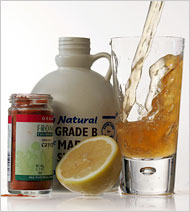Cleanses & Detoxifications
Cleanses/detoxes (specifically colon cleanses/detoxes) have been around since ancient times. Colon cleanses were performed to rid the body of intestinal toxins because those toxins were believed to poison the body. Cleanses work similarly to enemas. By the early 1900’s the procedure was no longer widely excepted although in recent years practices of this type have gained great popularity.
(Picture: one cleanse made popular by celebrities involves consuming only water, lemon juice, maple syrup and cayenne pepper.)
Most cleanses are deemed “herbal” and/or “natural” which gives the general public a false sense of safety. Cleanses tout claims of weight loss, ridding fatigue and headaches, immune function improvement, and enhanced cognitive abilities. There is insufficient medical evidence available that supports most of these claims.

The Journal of Family Practice notes that colon irrigation is not advised especially if the individuals has a history of the following diseases: gastrointestinal, hemorrhoids, kidney, or heart because these preexisting conditions increase the individuals risk of adverse effects. Also, that side effects include: nausea, vomiting, diarrhea, dizziness, dehydration, electrolyte imbalance, acute kidney insufficiency, pancreatitis, bowel perforation, heart failure, and infection.
Juice, Baby, Juice!
The American Cancer Society describes juicing as extracting juices from fresh, uncooked produce as an individuals main source of dietary intake. Juicing first became popular in the early 1990’s when claims that it could reverse ailments such as chronic disease as well as the natural aging process were being promoted.
Presently, there is no scientific evidence supporting any of the claims made by juicing proponents. In fact there are many disadvantages and complications with the use of juicing. Juice extractors actually remove the fiber containing pulp in the produce resulting in a lower fiber intake. Most types of produce used in the juicing process contain larges amounts of sugar, which not only can lead to weight gain, but also be harmful to diabetics.
If you are going to try juicing make sure to only make enough juice for one drink as freshly squeezed juice harbors harmful bacteria when left to sit.
It's not all bad news, though. Juicing can be a great way to include certain fruits and vegetables in your diet that you would not otherwise eat, but make sure that juicing is in addition to a healthy, balanced diet rather than your main source of energy.
Before beginning any new diet be sure to consult your physician and/or a registered dietitian.
____________________________
Post courtesy of Courtney Saia
Sources available upon request.
No comments:
Post a Comment